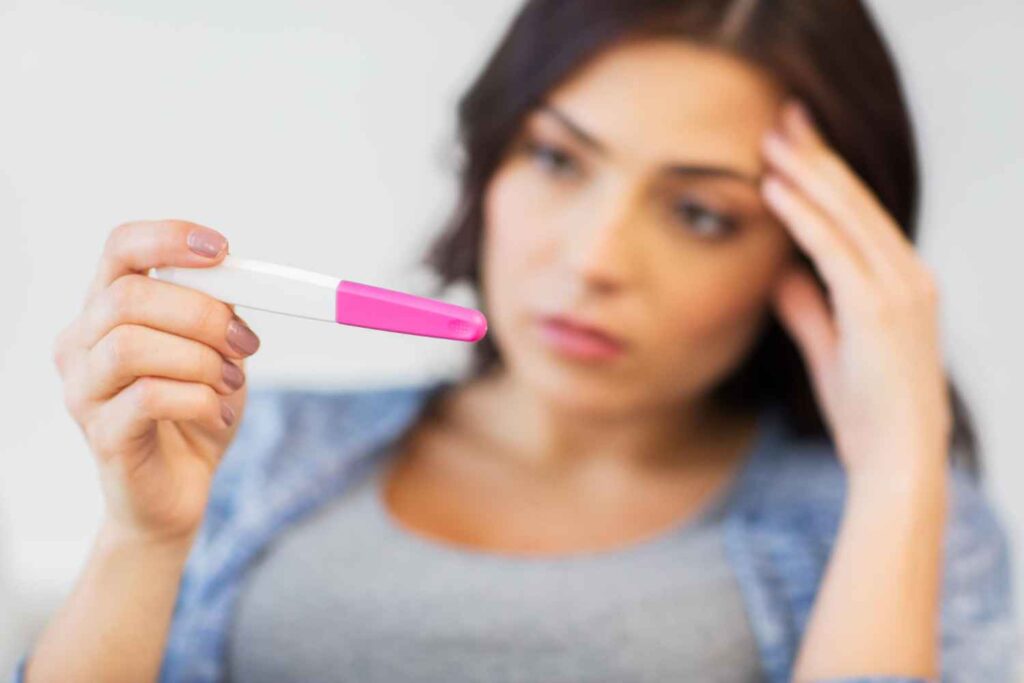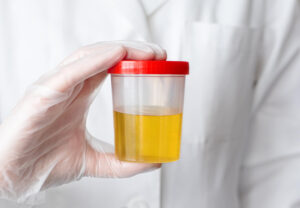Few moments in life feel as emotional as seeing two pink lines on a pregnancy test. For couples trying to conceive naturally—or through fertility treatments like IVF—that small strip can spark overwhelming joy and hope. But what happens when the test shows positive and later turns out to be false?
This is called a false positive pregnancy test, and while uncommon, it can be deeply confusing and heartbreaking. Understanding why false positives occur, especially for women undergoing IVF, can help manage expectations and ensure accurate next steps.
In this article, we’ll explain the causes of false positive pregnancy tests, how to prevent them, and how IVF patients should approach testing with the right guidance.
What Is a False Positive Pregnancy Test?
A false positive pregnancy test occurs when the test shows you are pregnant, but you are not.
How Pregnancy Tests Work
- Home pregnancy tests detect hCG (human chorionic gonadotropin), a hormone produced when a fertilised egg implants in the uterus.
- If hCG is present in your urine, the test usually displays two lines or a “+” sign.
- A false positive happens when hCG is detected even though a pregnancy has not developed or cannot continue.
Causes of False Positive Pregnancy Test
1. Chemical Pregnancy
- One of the most common causes.
- Occurs when a fertilised egg implants but doesn’t grow beyond the first few weeks.
- The body briefly produces hCG, leading to a positive test, but the pregnancy ends naturally.
2. Recent Miscarriage or Abortion
- hCG can remain in the body for several weeks after a pregnancy loss.
- If you test too soon, the lingering hormone may trigger a positive result.
3. Fertility Treatments / IVF Medications
- Many IVF cycles use hCG trigger injections to stimulate ovulation.
- Testing too early after the injection may show a false positive because the body is still processing the synthetic hCG.
4. Medical Conditions
- Certain conditions can raise hCG levels, such as:
- PCOS (Polycystic Ovary Syndrome)
- Ovarian cysts
- Rare types of tumours (e.g., trophoblastic disease)
These conditions may lead to a positive test without pregnancy.
5. Evaporation Lines on Test Kits
- If a test sits too long before reading, faint evaporation lines can look like a positive.
- This is why instructions should be followed carefully.
6. Improper Testing or Expired Kits
- Using an expired pregnancy test or testing incorrectly may give unreliable results.

How Common Are False Positives?
- Home pregnancy tests are highly accurate—around 99% when used correctly.
- False negatives (missed pregnancies) are more common than false positives.
- Still, in women undergoing IVF or other fertility treatments, false positives are more frequent due to medications and hormone fluctuations.
Prevention: How to Reduce the Risk of a False Positive
- Use High-Quality Tests
- Choose branded, sensitive test kits.
- Choose branded, sensitive test kits.
- Check Expiry Date
- Always confirm the test is within its shelf life.
- Always confirm the test is within its shelf life.
- Follow Instructions Carefully
- Test with first-morning urine for accurate results.
- Read results only within the time window given.
- Avoid Testing Too Soon After IVF Medications
- Wait at least 10–14 days after an hCG trigger injection before testing.
- Wait at least 10–14 days after an hCG trigger injection before testing.
- Confirm with a Blood Test
- A beta-hCG blood test done at a clinic is more reliable than urine tests.
What to Do If You Get a False Positive
Don’t Panic
False positives can be emotionally difficult, but they are not uncommon.
Retest After a Few Days
If unsure, repeat the test after 48–72 hours to see if hCG rises.
Get a Blood Test
A blood hCG test measures exact hormone levels and confirms pregnancy more reliably.
Schedule an Ultrasound
At around 6 weeks, an ultrasound can confirm whether a pregnancy has developed.
Seek Emotional Support
Couples, especially those in IVF programs, may need counselling to manage the emotional impact.
False Positive Pregnancy Tests & IVF: The Connection
Women undergoing IVF are more likely to experience false positives than others.
Why?
- IVF cycles often include hCG trigger shots to release eggs.
- If you test too early, the synthetic hCG is still detectable in urine.
- This can create the illusion of pregnancy when it’s only medication.
How IVF Patients Should Approach Testing
- Follow your fertility specialist’s timeline.
- Clinics typically schedule a beta-hCG blood test 10–14 days after embryo transfer to avoid false results.
- Never rely solely on home tests during IVF treatment.
Emotional Aspect
- False positives after IVF can feel like a cruel setback.
- Remember: a blood test and ultrasound are the only reliable confirmations.
When to See a Fertility Specialist
Consult a doctor or fertility expert if:
- You repeatedly get false positives or confusing test results.
- You have irregular cycles, PCOS, or endometriosis.
- You are planning IVF or other fertility treatments.
A fertility expert can guide you with proper testing, advanced monitoring, and counselling for emotional support.
Conclusion
A false positive pregnancy test can be a painful experience, especially for women and couples hoping to conceive. While rare, they occur due to chemical pregnancies, recent miscarriages, fertility medications, or medical conditions.
For IVF patients, false positives are more likely because of hormone injections and early testing. That’s why waiting for the beta-hCG blood test at your fertility clinic is essential before celebrating a pregnancy.
At Boon IVF, Hyderabad, we guide our patients through every step of their fertility journey. From accurate pregnancy testing to advanced IVF treatments, our specialists ensure that couples receive clear answers, compassionate care, and the best chance at a successful pregnancy. If you’ve experienced a false positive pregnancy test or are unsure about your results, don’t wait—consult Boon IVF today.


